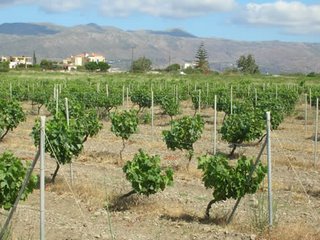 Some more thoughts on Cretan wine. There’s something appealing about wine that is drunk close to where it is made; that doesn’t see a bottle. The process of bottling wine, with its necessary addition of sulphur dioxide, rude exposure to mechanical forces, filtering (although this isn’t necessarily always a bad thing) and oxygen exposure, plus the whole issue of the transport/supply chain and closure choice implications, can take something away from the honesty and integrity of a wine, particularly an unambitious commercial wine designed for early drinking. You probably think I’m sounding a bit like a romantic hippy here, but it’s much easier to make a natural wine if it is to be consumed soon after purchase and doesn’t have to go through a bottling and finishing stage. Of course, if you are intending to cellar wine, or drink wine thousands of miles away from where it is made, this is a different issue. I remember at Mouchão in the Alentejo, there was a hosepipe connected to a tank: this is where the locals came to collect their wine, in five litre containers. What a lovely idea.
Some more thoughts on Cretan wine. There’s something appealing about wine that is drunk close to where it is made; that doesn’t see a bottle. The process of bottling wine, with its necessary addition of sulphur dioxide, rude exposure to mechanical forces, filtering (although this isn’t necessarily always a bad thing) and oxygen exposure, plus the whole issue of the transport/supply chain and closure choice implications, can take something away from the honesty and integrity of a wine, particularly an unambitious commercial wine designed for early drinking. You probably think I’m sounding a bit like a romantic hippy here, but it’s much easier to make a natural wine if it is to be consumed soon after purchase and doesn’t have to go through a bottling and finishing stage. Of course, if you are intending to cellar wine, or drink wine thousands of miles away from where it is made, this is a different issue. I remember at Mouchão in the Alentejo, there was a hosepipe connected to a tank: this is where the locals came to collect their wine, in five litre containers. What a lovely idea.I read a bit on holiday, although not in a focused way. Two books were consumed. The first was Paolo Coelho’s The Zahir. I came away with rather ambiguous feelings about this. He’s a tremendously successful Brazilian novelist whose books have sold in the tens of millions around the world (perhaps a bad sign). Indeed, I picked this up in Tesco (they sell all the bestselling paperbacks for £3.73, and this was the only book in the bestselling list that wasn’t either [a] chick-lit or [b] by Dan Brown) on a whim, knowing nothing about it. I sort of enjoyed it: Coehlo writes in a simple, accessible style, weaving together colourful characters with some sharp insights into the human condition and a bit of ‘spirituality’. But he is up his own a*** a bit. It’s as if he’s proposing a new religion based on his own worldview, where the ultimate goal is the realization of one’s own happiness.
I agree that we should be authentic to who we are, and that this might necessitate some journey of self discovery, or at least a smidgeon of self awareness. But where I feel Coehlo gets it badly wrong is that he assumes that any demand another may make of us is illegitimate, and that we can disregard all responsibilities we have to those in close relationship to us. In Coehlo’s world, it seems that it is our spouses, partners, children and friends are left to pick up the tab for our journey of self realization.
The second book was Irish Murdoch’s The Philosopher’s Pupil, a curious, long, rambling black comedy with a cast of diverse and universally dysfunctional characters. It’s conveys a slightly nihilistic view of human relations; no one comes out very well at all in the end. Still, the characterization, prose and somewhat bizarre story line are sufficiently gripping to keep the reader’s attention to the end.


4 Comments:
You seem given to philosophic thought--something that seems common among wine anoraks (jancis robinson studied philosophy and maths at oxford, remington norman achieved a PhD in philosophy, and David Schilknecht earned a masters). Might I suggest Ted cohen's The Philosophy of Jokes, an amusing exploration of humor that is (not surprisingly) full of keen insights into the human condition.
Jason
Thanks for the suggestion
Weighty holiday reading! I use the hols to furtively read tripe where no-one else can see me reading it...
I have not read Coelho, but have preconceived ideas about his work that you have confirmed. I shall pass.
I like to read tripe too - just didn't have anything to hand. My favourite lowbrow reading is as follows: Nevil Shute (I have all his books - a gifted storyteller) and Susan Howatch (the Starbridge series). Please promise to tell no one, lest they think me non-serious.
Post a Comment
Links to this post:
Create a Link
<< Home